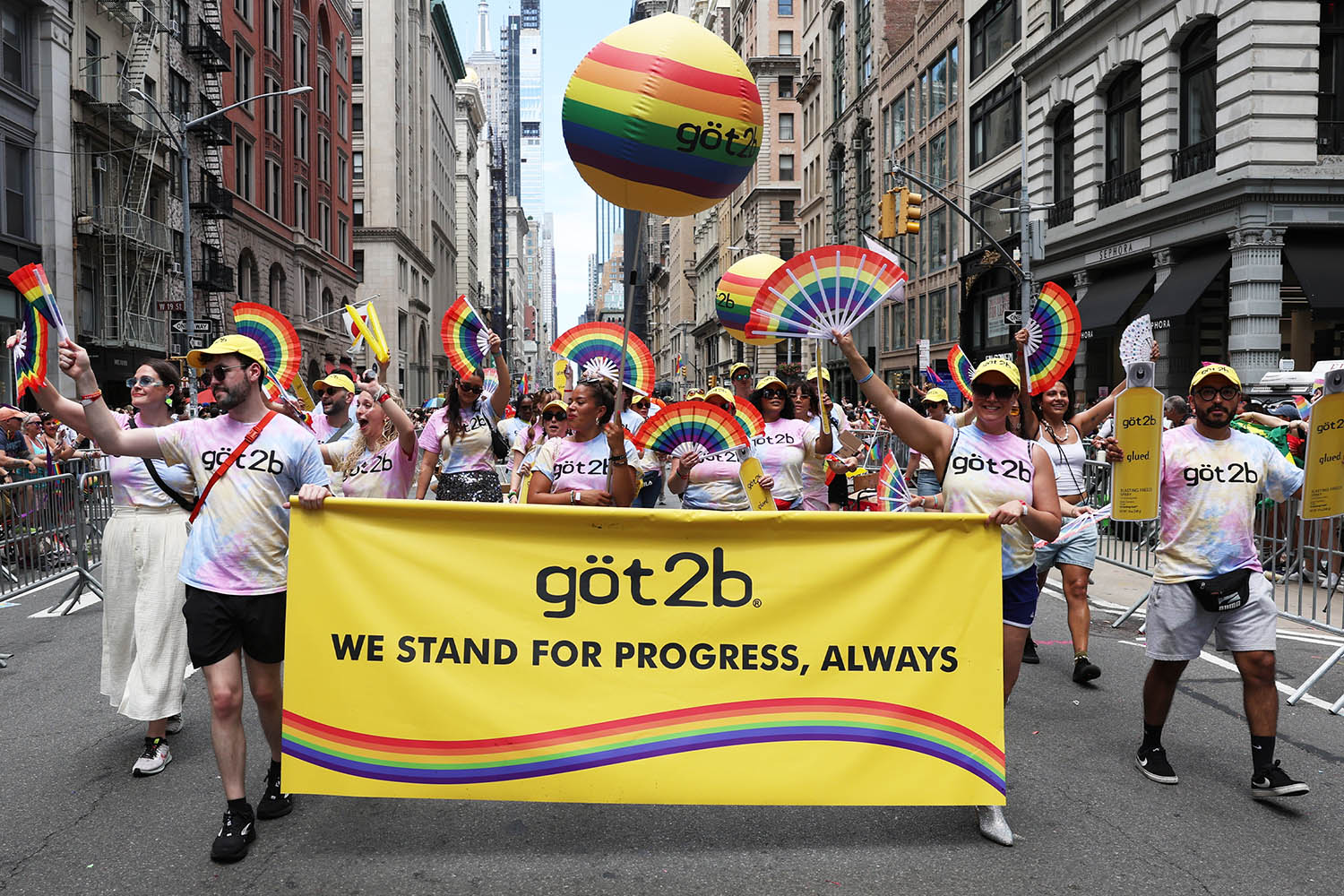When the clear-up from Saturday’s London Pride begins, sweeping rainbow flags into neat piles and washing glitter from the streets, a question mark will hover over similar events around the world next year: where is the money going to come from?
As companies roll back their diversity, equity and inclusion (DEI) spending, spurred in part by Donald Trump’s attack on diversity initiatives, their sponsorship for Pride marches has been radically reduced this year, caught between the twin demands of politics and tighter budgets. Rainbow capitalism, as it’s become known, is under threat.
Figures from the UK Pride Organisers Network provided to Bloomberg show that three quarters of more than 100 Pride groups around the country reported a drop-off in corporate funding. More alarmingly, 25% of those said that sponsorship money had fallen by more than half.
Even flagship events have felt the pain. New York Pride, which last weekend saw more than a million people take to the streets of Manhattan, announced earlier this year that it was scrambling to fill a $750,000 (£550,000) funding gap as major multinationals, such as Mastercard and Nissan, stepped back or downscaled their involvement.
Both companies said they remained committed to the cause – if perhaps not quite the cash this year.
Mastercard stressed it was continuing “that commitment by proudly participating in the NYC Pride March” last weekend, while Nissan said “the company remains committed to promoting an inclusive culture for employees, consumers, dealers and other key stakeholders”.
But beyond the corporate flannel, the fact remains that funding for LGBTQ+ events is falling – and fast.
There was, and has remained, a healthy scepticism about the motivations of corporations
There was, and has remained, a healthy scepticism about the motivations of corporations
Duncan Hothersall, co-founder, Edinburgh Pride
A survey in April of communications and public affairs executives at some of America’s largest companies is shocking reading. It revealed that “39% of companies plan to reduce Pride-related engagement in 2025”, adding, “notably, no respondents reported plans to increase engagement”.
Matt Şeniz-Cheng, associate director of corporate partnerships at NYC Pride, confirmed that the event lost about 25% of its corporate support this year. “It was disappointing,” he says. But it also spurred the community into action.
NYC Pride had 68 corporate sponsors last year, providing much of the estimated $3m it costs to stage the event. This year, it saw 82 sign up, with many of the new donors being queer-owned local businesses.
Newsletters
Choose the newsletters you want to receive
View more
For information about how The Observer protects your data, read our Privacy Policy
This did not completely cover the shortfall, adds Şeniz-Cheng, but aided by 300 individual donors chipping in close to $130,000, it helped “us close the gap and making sure that we can continue on into next year”.
The perennial debate over whether Pride should be a party or a protest – or, at times, an uncomfortable mixture of the two – has raged for decades.
The notion of companies tapping into the LGBTQ+ market used to be known as the “pink pound”: advertisers waking up to the fact of the queer consumer’s fondness for vodka and the odd swanky holiday in Mykonos or Palm Beach.
But then, as now, it was always controversial. Arguments flared regularly within Pride organisations about the merits of taking corporate cash for an event that was supposed to be as much about the protest as the party.
Duncan Hothersall, who helped found Edinburgh Pride in 1995, remembers the days of “rattling buckets” and doing contra deals with local LGBTQ+ businesses. He estimates that the very first Pride, which saw more than 3,000 people march along the city’s Princes Street, cost about £25,000 to hold. But even then, the notion of seeking cash from companies was problematic.
“There was, and has remained, a sort of healthy scepticism about the motivations of corporations,” he says. Anyone who has been involved in organising LGBTQ+ events over the years, would have given “a wry smile recently”, Hothersall adds, “about realising that when companies say ‘we’ll always support you’ [it turns out to be] more of a line”.
It is more than 50 years since queer people took to the streets of London, New York and San Francisco on the very first Pride marches. Julian Hows, who at 17 was at London’s first event in 1972, neatly sums up the progress made – and the support that still exists.
“Back then we were having a party, darling,” he says, his voice blurred from attending a Pride party the night before. In 1972, he was dressed in “a Day-Glo pair of ’loons, a little blouse top and full make-up with lots of necklaces and jewellery”.
Fast forward 50 years, and Julian was in “a rather loud red silk suit” as one of the guests at a recent event celebrating Pride held by the London Stock Exchange. “And, darling,” he points out, “you can’t get more corporate than that.”
Hugo Greenhalgh is the author of The Diaries of Mr Lucas: Life in 1960s Gay London (Atlantic Books, 2025)
Photograph by Manoli Figetakis/Getty Images
